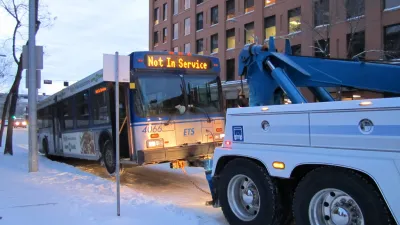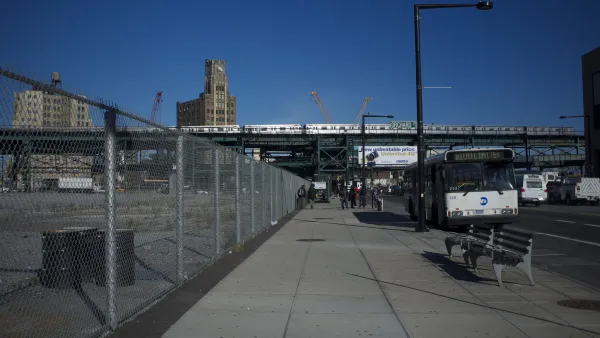In light of the resignation of APTA's president following the withdrawal of the New York Metropolitan Transportation Authority, the Transit Center offers its recommendations for reforming the national transit advocacy organization.

"APTA President and CEO Michael Melaniphy resigned late last month following news that New York’s Metropolitan Transportation Authority [MTA]—which carries 35 percent of the country’s transit riders—was withdrawing from the industry association," writes the TransitCenter.
In the [7-page] letter [PDF] announcing the agency’s decision..., MTA President Tom Prendergast implied that transit agencies in other large cities shared these sentiments. Prendergast described the agency’s “collective dissatisfaction with various aspects of APTA,” including the organization’s governance structure, its excessive membership dues, and Melaniphy’s annual compensation of nearly $900,000. [More reasons posted here].
TransitCenter, a New York City-based transportation research, advocacy and funding organization, views the vacancy as "an opportunity for APTA to move decisively in a new strategic direction."
The case for transit is stronger than ever, between the need to combat climate change through our transportation habits, the decline in driver’s license possession among young people, increased scrutiny of highway-building, and the prominence of socioeconomic inequality as a political issue.
Among TransitCenter's recommendations:
- Widen its leadership to "include advocates with expertise in poverty reduction, urban planning, and housing."
- Become less federally oriented (the group is based in D.C.) and more locally focused, e.g., "ensuring its members are effective advocates against auto-centric development policies."
Among the more controversial recommendations is to deal openly with what Planetizen called "half-baked" rail projects:
It’s hard for a membership-based organization to tell any of its members that they have an ugly baby. But let’s face it: some transit agencies propose (and build) projects that are functionally useless, bad value for money, or just inherently flawed.
State and federal leaders often hesitate to criticize local transit boondoggles for fear of jeopardizing a ribbon-cutting. That’s why APTA is in a uniquely powerful position to educate local officials about transit planning from the ground up, encouraging them to ask what ends they seek to achieve with transit rather than what a particular project should look like.
Finally, TransitCenter recommends that APTA align itself more with "biking and walking advocacy groups" and less with the "highway lobby."
Click here for past posts on TransitCenter.
Hat tip to Martine Powers of POLITICO Morning Transportation.
FULL STORY: The APTA Transit Needs

Analysis: Cybertruck Fatality Rate Far Exceeds That of Ford Pinto
The Tesla Cybertruck was recalled seven times last year.

National Parks Layoffs Will Cause Communities to Lose Billions
Thousands of essential park workers were laid off this week, just before the busy spring break season.

Retro-silient?: America’s First “Eco-burb,” The Woodlands Turns 50
A master-planned community north of Houston offers lessons on green infrastructure and resilient design, but falls short of its founder’s lofty affordability and walkability goals.

Test News Post 1
This is a summary

Analysis: Cybertruck Fatality Rate Far Exceeds That of Ford Pinto
The Tesla Cybertruck was recalled seven times last year.

Test News Headline 46
Test for the image on the front page.
Urban Design for Planners 1: Software Tools
This six-course series explores essential urban design concepts using open source software and equips planners with the tools they need to participate fully in the urban design process.
Planning for Universal Design
Learn the tools for implementing Universal Design in planning regulations.
EMC Planning Group, Inc.
Planetizen
Planetizen
Mpact (formerly Rail~Volution)
Great Falls Development Authority, Inc.
HUDs Office of Policy Development and Research
NYU Wagner Graduate School of Public Service



























